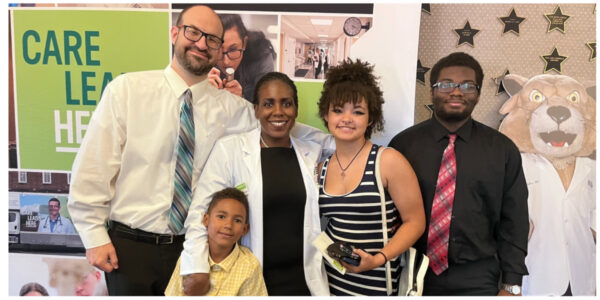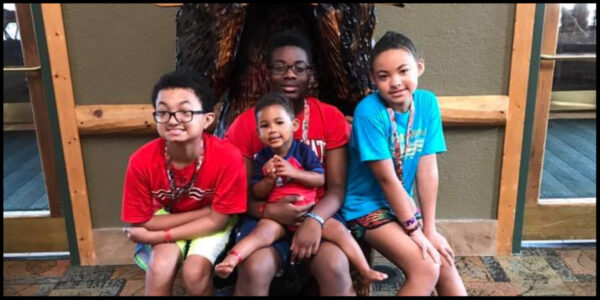For Shamone Gore Panter, 43, of Elyria, Ohio, a suburb of Cleveland, life has been a balancing act as she’s juggled professional and family responsibilities.
It wasn’t until the COVID-19 pandemic when she saw the impact Black doctors can have on Black patients, that she decided to reset her sights on fulfilling a dream.
Gore Panter is a research scholar at the Cleveland Clinic. She teaches an online class at the clinic and is a wife and mother. Now she’s working on adding the title of family physician to her list.
The 43-year-old is currently enrolled at Ohio University’s Heritage College of Osteopathic Medicine, taking medical school courses online. It’s a predicament she could not have imagined 16 years ago. In 2007, Gore Panter considered medical school, but she was too intimidated by the Medical College Admission Test or MCAT.
“I am not a scary type person, but that is the one thing I can say in my life that literally terrified me,” Gore Panter said.

Gore Panter was always interested in working in health care after her mother died in 2001 of a heart attack at 41. She wanted to learn more about cardiovascular health and the risk factors she and her sister potentially had following their mom’s death. Instead of going the medical doctor route, she earned her doctorate degree as a researcher focused on cardiovascular genetics at the Cleveland Clinic. She also worked as an assistant lecturer at Cleveland State University.
For years, she had become content with being a researcher until the COVID-19 pandemic unearthed generational skepticism felt by many African-Americans. Gore Panter’s niece was pregnant at the time and asked her knowledgeable aunt about the COVID-19 vaccine. The vaccine faced skepticism, especially from Black and brown communities, due to America’s history of medical experimentation on Black bodies.
Gore Panter encouraged her niece to take the vaccine to help protect herself and her unborn child.
“She went the next day to take the vaccine,” Gore Panter said.
The conversation Gore Panter and her niece had opened her eyes to something she didn’t fully realize.
“I thought, this is what I need to be doing every day,” Gore Panter said.
She realized the power of Black medical professionals sharing credible and trustworthy advice with Black patients.
“That could be me. I might not be able to solve all the problems, but sometimes seeing someone who looks like you give you at least a foot in the door to maybe try to talk to people and give them information to potentially take better care of their health,” Gore Panter said.
After successfully advising her niece, Gore Panter knew she wanted to become a medical doctor and fulfill an ambition she once started in 2007. She felt she could be essential to fostering greater trust between the Black community and the health care industry. However, in order to become a medical doctor, she knew she had to overcome her fear of the MCAT.
“My colleague said, ‘OK, we’re going to take this test, and if you get over 500, we’re going forward…so I took the test and got more than a 500,” Gore Panter said.
Usually, prospective medical students spend years preparing for the MCAT, but Gore Panter’s sudden decision left her with only a couple of months. She started preparing for the test in June 2021 and took the test that August. In September, Gore Panter learned she passed the test.
“Don’t let fear be the reason you’re not doing what you’re called to do,” Gore Panter said of passing the exam.
In November 2021, Gore Panter was accepted into medical school, and she started classes in August 2022 to begin her first year of the accelerated program. She feels all the stars aligned in a timely fashion for her to fulfill her dream of becoming a doctor.
“That was God’s way of saying this is where I was supposed to be because it doesn’t line up that good,” Gore Panter said.
“It is an intense three years because we do the same thing as everyone else but then with the added stuff on top. We get to see patients every week. It helps us solidify the things that we’re learning in class,” Gore Panter said of medical school and her research work at the Cleveland Clinic.

As her goal of wearing her own white coat was becoming a reality, at home she credits her family for their unyielding support. She admits communication at times can be limited to text messaging especially for her 17, 19 and 20-year-olds. Her youngest child is 7 and demands more of her time and attention.
“I have a supportive husband, a supportive family and I just try to be as organized as I can,” Gore Panter said.
She admits between her job and school she can be away for 12 hours at a time. However, when she finally gets home, she tries to stay on the move.
Despite her lifestyle juggling researching, lecturing, and studying, along with being a wife and mom, Gore Panter maintains a positive attitude for the long-term benefit she feels she can bring to her patients and loved ones.
“Having that opportunity to build that relationship makes a big difference because that is the person you trust, the person whose advice you are more willing to take,” Gore Panter said.
Gore Panter is expected to complete medical school in May 2025 and intends to work as a family physician at the ripe age of 45.
“It doesn’t matter how old you are, if you’re still alive, you can go try,” Gore Panter said.


